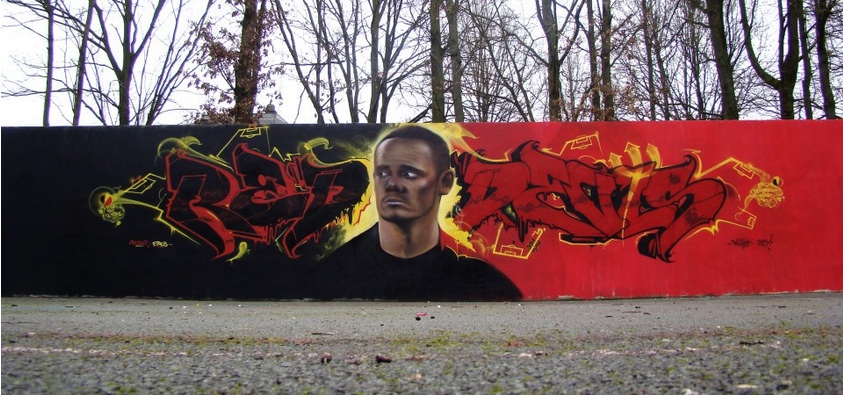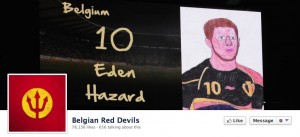*
Until quite recently, the Belgium international football team, and particularly its national governing body, had fallen out of favour with fans across the nation. The Belgian FA were perceived as a hindrance and a negative influence on the game; the team were not embraced. Ian Herbert explains how things have changed, rapidly. This is a story about marketing, but not as we know it …
.
15 April 2013
The national cynicism and indifference about the Belgian team and the country’s Football Association has been like our own – perhaps worse – in recent years. That’s saying something in an era when it has been considered de rigueur to boo Ashley Cole and Gary Neville, to name just two, at Wembley and to launch insults at Rio Ferdinand, in absentia.
Neville came to hate playing at the old Wembley because of it.
When the Royal Belgian Football Association (KBVB) undertook a survey to find out how it was perceived, two years ago, it discovered that people had even less faith in it than they did the nation’s banks.
The KBVB were generally being slaughtered on Twitter – “a slagging” is how the Belgium FA’s business director Bob Madou describes it – and they knew that putting things right would be difficult, such were the negative connotations of the association and the cynicism of the nation’s media and the world of football.
What happened next was remarkable. The Association hired a marketing company, Boondoggle, and approached some of the squad’s more enlightened players – Manchester City and national captain Vincent Kompany, Tottenham’s Jan Vertonghen and Arsenal Thomas Vermaelen – to say that they badly wanted to do something about this reputation.
They wanted to introduce a new brand for the Belgian football team – who would become the Red Devils – but also to do something about the relationship between the players and supporters. The latter simply viewed the former as millionaires “who carried Luis Vuitton luggage and drove flash cars,” says Madou. There was no connection.
As Madou confided at the SoccerEx football convention in Manchester last week, the strategy was “not to concentrate on the opposition but on the relationship between the team and fans.”
The supporters were encouraged, though videos posted regularly by one or two of the players, to undertake challenges relating to the team’s matches. They were asked to paint the country red, for instance. And they were asked to fill the 46,000 capacity national stadium in Brussels with children’s pictures of the players. And to “collect” 500,000db of fan noise.
In return, the players would deliver something back which went beyond making an effort on the pitch.
They would be sprayed with red paint and they would select the pictures they most liked and show them on social media. In return for fans ‘collecting’ the noise, some of the players took part in a kick-about wearing inflatable sumo costumes.
Here it is (article continues below):
It’s great viewing, seeing Marouane Fellaini and Co launching into sumo mode, but it reveals a team spirit which draws the fans in. As one Belgian writer, Wim Van Walle, puts it: “The clips show a group of players who value each other’s capabilities and contributions. On top of that, they’re having fun. All of this has helped create a genuine love for the Red Devils, unlike anything since the 1980s.”
These are small gestures which, football being the cynical world it is, might provoke a sneer from some who read of it. But there is no doubt that they have inculcated the kind of excitement about Belgium’s games which tends only to exist in the heat of a summer international tournament.
A town called Geel (Belgian for ‘yellow’) renamed itself Rood (red).
Another of the paybacks for fans was to have 10,000 of their faces, from Facebook, etched onto the side of the red team bus, in miniscule. “I’m close to the wheel,” Boondoggle’s strategic director, Peter Verbiest, told SoccerEx.
The Belgian Red Devils own Facebook page is one of the fastest growing in popularity in the country.
Initially, there was no attempt to involve the newspapers. “We did not take the campaign to the journalists. There is no point trying to force things on them. It would have killed their enthusiasm at the beginning,” says Madou.
Instead, they let the relationship between players and supporters build – “the sumo was basically filmed in ten minutes after a training session” – and then the media wanted to get involved in what it considered to be ‘news.’
 The paintings concept made impressive material: 46,000 flags with children’s paintings on, one on each seat. One of these drawings, of Eden Hazard (left), adorns the top of the Red Devils Facebook page.
The paintings concept made impressive material: 46,000 flags with children’s paintings on, one on each seat. One of these drawings, of Eden Hazard (left), adorns the top of the Red Devils Facebook page.
There’s also been a new logo ‘red devil’ diable rouge logo – “it’s the ABC of marketing: if you are in deep shit, get a new brand!” says Verbiest – which is at the core of the new Belgian team’s Facebook page and a merchandising operation.
The Association wants to take the next step and put the logo on its team’s shirts, alongside the traditional logo which carries no real meaning. There are 220 official red devil fan clubs in the country, with 15,000 members.
Madou says there was no political intent behind the campaign but it is no exaggeration to say that the football team’s ‘adoption’ has had political consequences. The country is sometimes torn between its Dutch-speaking North and Francophone South, but the Belgians are supporting the national team as one. In October after beating Scotland, manager Marc Wilmots, who enjoys support from both communities called on his compatriots to “remain united”.
The Heysel stadium in Brussels sold out for the fifth successive time for the Scotland game in the World Cup qualifier last October – one of the Association’s prime targets when it began its attempts at re-engagement.
The emergence of an exciting, talented group of players has certainly helped, gradually convincing Belgians that the great days of the 1980s, when they were runners-up at Euro 1980 and reached the semi-finals of the 1986 World Cup, can be repeated. But the Association are convinced the support would survive the almost inconceivable notion of non-qualification for Brazil.
All of which provides a genuine reason why Kompany was so determined to return to play in this months’ qualifier against Macedonia – causing his club manager Roberto Mancini to criticise him, since he had not played competitive football since sustaining a calf injury in late January.
Madou was far too diplomatic to suggest that the Belgian nation were indignant about Mancini’s criticism of their captain. “I’m in the nice position that I don’t have to talk about players and their availability,” he said.
And yet it is clear that Kompany, more than any other player, has persuaded the younger, less deep-thinking members of the squad, like Eden Hazard, that participation in this campaign is something which actually do them a lot of good.
“I can honestly say that if I’m in conversation with Vincent it’s a completely different kind of conversation,” saus Madou. “I think he is not only intelligent but visionary in certain ways.”
SoccerEx neared its conclusion with Roy Hodgson ruminating on how clubs and players have presided over a “lessening” of the value of international football, by viewing international breaks as jollies to skip. The mood of gloom was unmistakable.
The Belgians will tell Hodgson that there can be another way.
.
Ian Herbert, who was shortlisted as Sports Journalist of the Year in the prestigious Press Awards, and highly commended in the SJA Sports News Reporter of 2012 category, is The Independent’s Northern Football Correspondent (see archive of his work here). Follow Herbie on Twitter here.
.
Follow SPORTINGINTELLIGENCE on Twitter
Sportingintelligence home page










